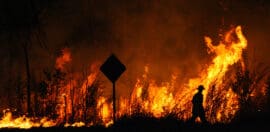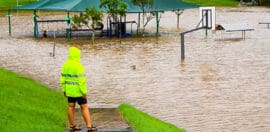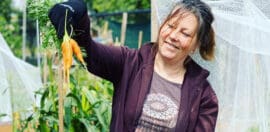Dire impact of climate emergency on children revealed

27 September 2021 at 5:22 pm
Save the Children says Australian kids are already witnessing the devastating impacts of climate change, and warns that things will only get worse
Australia is facing a child rights crisis of the highest order, with the next generation set to experience a surge in droughts, bushfires and floods over their lifetime unless strong climate action is taken, new research shows.
Modelling developed by international climate researchers from the Vrije Universiteit Brussel examines what climate disasters a child born in 2020 will experience on average under current Paris Agreement pledges, compared with a person born in 1960.
The data shows that Australian children can expect to face 3.4 times as many droughts, 1.5 times as many river floods and bushfires, as well as four times the number of heatwaves.
Save the Children has used this modelling for its new Born into The Climate Crisis report, which warns that climate change is “inextricably linked to wider issues of inequality and failures to uphold children’s basic rights”.
Report author Erin Ryan, Save the Children’s pacific policy and advocacy advisor, told Pro Bono News she was not surprised by the findings.
“This report really affirms what children have been telling us time and time again – that the climate crisis is a child rights crisis of the highest order,” Ryan said.
“There’s been this real tendency to think about the climate crisis as a future problem. And it’s not, it’s a problem that’s here and now, and it’s just becoming worse by the day.”
Ryan said the crisis would particularly impact those in regional bushfire-prone communities and First Nations children, who know the realities of climate change all too well.
She said it was important to note how climate disasters posed a direct threat to children’s rights.
“When bushfire smoke is travelling down the east coast of this country and filling children’s lungs, they’re deprived of their right to the highest attainable standard of health,” she said.
“And when we have floodwaters pouring into classrooms and destroying telecommunications infrastructure, then children’s rights at all levels of education are at risk.”
While current climate pledges are estimated to create between 2.6°C and 3.1°C warming, the report said governments must accelerate efforts to limit warming to 1.5°C.
The modelling suggests that compared with the current trajectory, limiting warming to 1.5°C would reduce the lifetime exposure of children globally to heatwaves by 45 per cent, droughts by 39 per cent, and river floods by 38 per cent.
Save the Children made several recommendations on how the Australian government can play its part in achieving this.
These include committing to a more ambitious emissions reductions target, rapidly phasing out fossil fuel use and subsidies, and providing more climate financial support for lower income countries.
Ryan said the Australian government has so far failed to recognise both the severity and the immediacy of the climate threat.
She added it was also important for children to be given a platform to formally engage in climate policy making.
“This data shows that children are being disproportionately impacted by this climate crisis. That’s not of their own making,” she said.
“So it’s so important that they’re not just discussed at the decision makers table, but that they actually have a seat there too.”
The UN’s pre-COP26 Youth Summit commenced on Monday in Milan, with 14-year-old Ella Simons representing Australia as youth delegate.
She agreed that children needed to have a seat at the table whenever climate action was being discussed.
“While adults in power ignore the issue, it is young people who have to take action. We are rallying to make a point that this isn’t something we can delay action on,” Simons said.
“But we shouldn’t have to be doing this. We shouldn’t have the responsibility of the future of the world on our shoulders. It is key that our leaders hear and listen to us, because we have the most to lose from this crisis.”
You can see the full report here.







